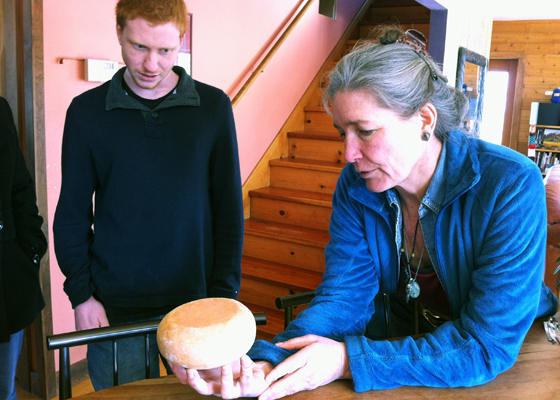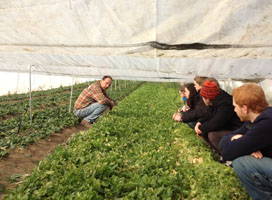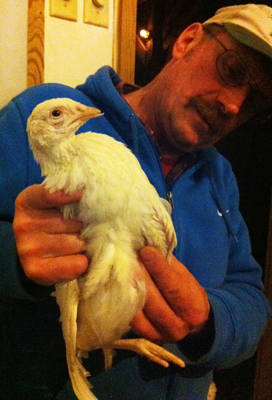

Venture Boldly

Adriana Colindres
Features Editor
2 East South Street
Galesburg, IL 61401

 By Audrey Todd ‘12
By Audrey Todd ‘12
Knox College students visited the diverse agricultural landscape of southern Wisconsin to get a first-hand look at one of the country's most vibrant regional food systems.
The February 16 trip, organized by Visiting Assistant Professor of Environmental Studies Nic Mink for his "American Food Systems: Past to Present" course, offered students an opportunity to get close to many of the concepts they've learned during the term.
"It's really about linking theory and practice," said Mink, an expert in food systems and food policy.
The first stop was Snug Haven Farm, a grower for some of the Midwest's most renowned restaurants, including Rick Bayless' Frontera Grill in Chicago, Illinois. Bill Warner, Snug Haven's owner, spent his morning with the Knox students, showing them how he produces his frost-sweetened spinach, a food that has made his farm a national model for year-round growing. (Photo at right: Bill Warner talks about spinach with Knox students.)
"The biggest thing for me is that I had never been to a farm and met the farmer. I thought it was really cool seeing how the different crops go together," said Knox senior Brenna DeGan, a native of Naperville, Illinois, who is majoring in history and political science. "He (Warner) planted potatoes even though they don't have a high yield because they are an organic way to help fight a spinach bug called symphlan."
The students also had the opportunity to learn about artisanal, raw milk cheese production at Bleu Mont Dairy with co-owner Kitas McKnight. (Photo at top of page: Kitas McKnight, co-owner of Bleu Mont dairy, explains cheese production to Knox student Evan Lewitus.)
McKnight, who expressed amazement in the change in the food system in just the last 20 years, emphasized the need "to educate one customer at a time about what you eat and how you treat your body. If that can be changed, it's going to help prevent environmental disasters and health disasters."
 To get an idea of how poultry farming works, the students met with owner Greg Wolff of Wolff's Bellefontaine Pheasant Farm in Basco, Wisconsin. Wolff showed off his entire production system to the students, from his incubators to his mature birds. He said that one of the highlights of his long career as a pheasant farmer was providing the pheasants for President Barack Obama's inaugural dinner in 2009. (Photo at left: Greg Wolff explains pheasant anatomy to students in terms of meat production.)
To get an idea of how poultry farming works, the students met with owner Greg Wolff of Wolff's Bellefontaine Pheasant Farm in Basco, Wisconsin. Wolff showed off his entire production system to the students, from his incubators to his mature birds. He said that one of the highlights of his long career as a pheasant farmer was providing the pheasants for President Barack Obama's inaugural dinner in 2009. (Photo at left: Greg Wolff explains pheasant anatomy to students in terms of meat production.)
"It was really interesting to see commercial meat production facilities after the organic agriculture," said Will Bouman, a sophomore from Oak Park, Illinois, who is majoring in environmental studies.
Students finished their day at Madison's acclaimed L'Etoile, a pioneering farm-to-table restaurant celebrated by Food and Wine and Gourmet magazines as one of the nation's best restaurants.
The Knox group received a behind-the-scenes tour with executive chef and co-owner Tory Miller, who stressed the importance of restaurants in building healthy, sustainable food systems. L'Etoile works with more than 200 small farmers in Wisconsin to source its entire menu.
"I thought it was fascinating that they butchered their own animals in that small of a kitchen," said Knox junior Evan Lewitus, an environmental studies major from Annapolis, Maryland.
"This was an incredible experience for the students, and it was so great to have Snug Haven, Bleu Mont Dairy, Bellafontaine, and L' Etoile be so generous with their time," said Mink. "It speaks highly of their commitment to building more sustainable food systems and also to their commitment to educating future food leaders."
Published on February 17, 2012